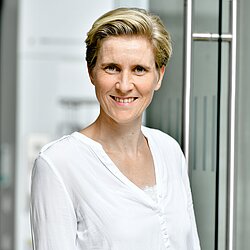Center for Individualised Infection Medicine
The CiiM (Centre for Individualised Infection Medicine) is a joint initiative of the Helmholtz Centre for Infection Research (HZI) in Braunschweig and the Hannover Medical School (MHH).
The activities based at CiiM will explore the influence of individual patient and pathogen conditions on susceptibility to infection, disease progression and therapeutic success. Optimised individualised patient care is the goal.
The realisation of this vision requires an interdisciplinary, patient-oriented bundling of different clinical and research departments. The construction of a dedicated CiiM building in the direct vicinity of the MHH and the other research facilities of the Hannover Biomedicine Site has a key function in this regard. This investment by the federal government via the Helmholtz Association and the state of Lower Saxony will also be a crystallisation point for future investments and industrial collaborations.
What's behind it all
CiiM combines clinical and scientific expertise from infection research and medicine for a future-oriented individualised infection medicine.
CiiM is a joint institution of the HZI and the MHH.
The idea for a center dedicated to individualised infection medicine was first mentioned in 2013. Two years later (2015), the partner institutes signed the letter of intent for the joint establishment of CiiM and completed the foundation of the initially virtual CiiM.
The planned CiiM building will be constructed in close proximity to the Center for Experimental and Clinical Infection Research TWINCORE and the MHH and will house modern laboratories, technology platforms and informatics interfaces on approximately 2,100 sqm of floor space upon completion.
25 million EUR will be provided by the Helmholtz Association, the State of Lower Saxony and the Helmholtz Centre for Infection Research for the construction of the CiiM building.
![[Translate to English:] CiiM Leitbild [Translate to English:] CiiM Leitbild](/fileadmin/_processed_/3/6/csm_190604_slider3_copyright-Debarry-CiiM_5a5a25751d.jpg)
Vision, mission and strategy
Based on our mission statement, we have developed a strategy for the coming years that will allow us to build an innovative center in Hannover that can address the pressing issues of infection medicine for the benefit of the individual patient.
The Mission
To realise this vision, interdisciplinary teams at CiiM are studying individual infection courses. Existing routine data from the clinic are brought together with newly collected molecular data of the individual patient and the pathogen to generate predictive parameters for the course of infection and therapeutic success using computer-assisted methods. This patient-centered and data-based approach of CiiM provides the treating physician with an important guide for tailored prevention and therapy, thus enabling individualised patient management and evidence-based medicine.
The Strategy
At CiiM, the focus is on the individual patient and their best possible treatment. For this, a comprehensive overview of the current state of research is crucial in addition to clinical expertise. Therefore, all CiiM activities are based on a concrete clinical need and aim at improving patient treatment.
Patient cohorts are defined for questions and problems in infectious medicine that are relevant in everyday clinical practice (Clinical Core), and the included patients are systematically subjected to in-depth characterisation (e.g. molecular diagnostics) that goes beyond routine diagnostics. In this context, the accommodation of patient-related and study-related services in the CiiM will facilitate the inclusion of patients. Furthermore, outpatient rooms in CiiM will allow tracking of patients beyond their hospital stay, which is critical for temporal and dynamic resolution of infection and healing processes as well as the effects of therapy.
For molecular diagnostics, genomics and post-genomics technologies will be established at CiiM with connected laboratory space for sample preparation including a central pipetting laboratory with robotics and connected office space for data processing (Technology Core). In addition, the establishment of a group for the technological (co-)development and testing of innovative measuring devices (e.g. wearables, point-of-care diagnostics) is planned. Furthermore, the operation of a branch of the Hannover Unified Biobank at CiiM will enable the processing and storage of infectiological samples and also ensure direct connection to the central biobank (Biobank).
Data scientists from the fields of bioinformatics and medical informatics as well as modeling and simulation will integrate the clinical data of the patients available, for example via the Clinical Data Warehouseder MHH, link them with the newly acquired data and analyse them (Data Science Core). With the help of various methods of modeling and simulation, predictive models are created on the basis of these data collections, which, for example, provide indications of possible biomarkers or reveal relationships that are not yet known. With the help of learning models (artificial intelligence), the available data allow patients to be classified on the basis of parameters already collected and can be translated directly into treatment recommendations such as therapy optimisation.
These individualised approaches are validated and exploited in prospective studies in everyday clinical practice (Translational Core). In addition, new therapeutic options are being explored for specific patient groups and the testing of promising strategies in clearly defined patient groups is being prepared with the support of the central CiiM units on ethical issues, quality assurance, standardisation, study support and coordination (Central Units). These units will also support the establishment of new fields of research, foster interaction between expert cores and accelerate translation of results.
In parallel, the deciphering and experimental validation of the underlying mechanisms of the developed models and biomarkers (Research Core) is performed in cooperation with HZI and TWINCORE. The mechanistic understanding gained in this way will enable targeted further development of therapeutic strategies.
